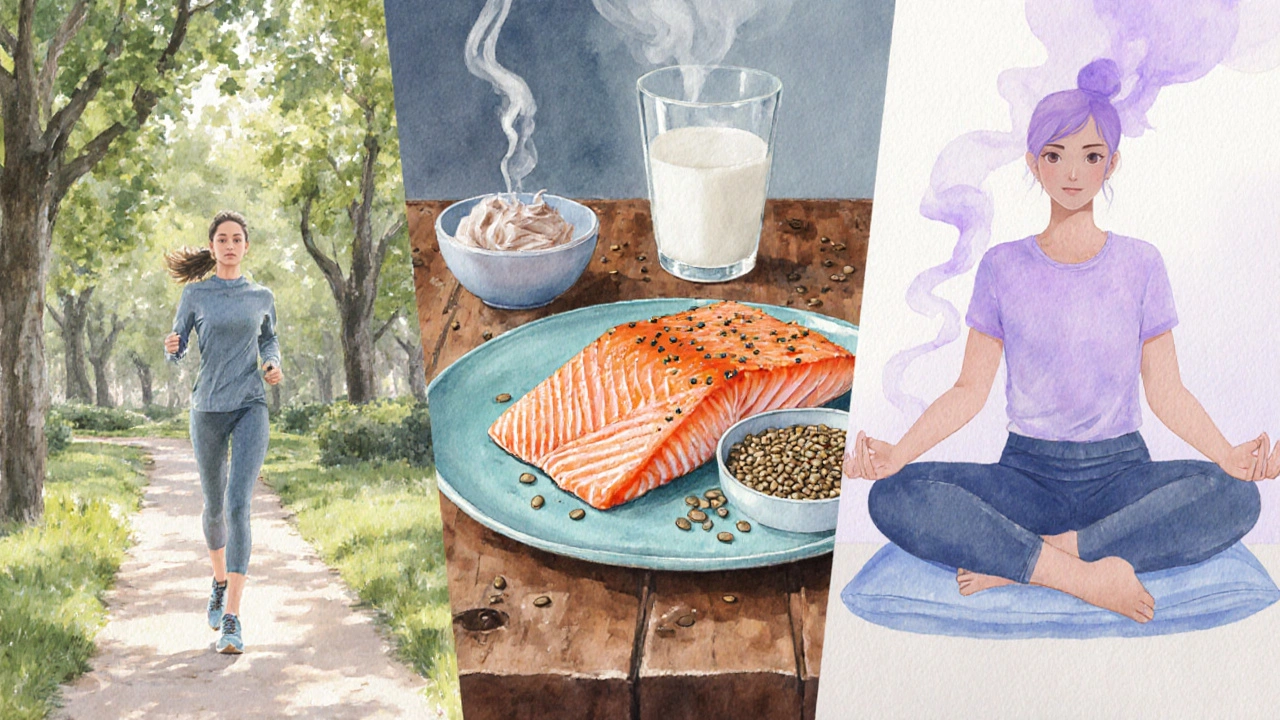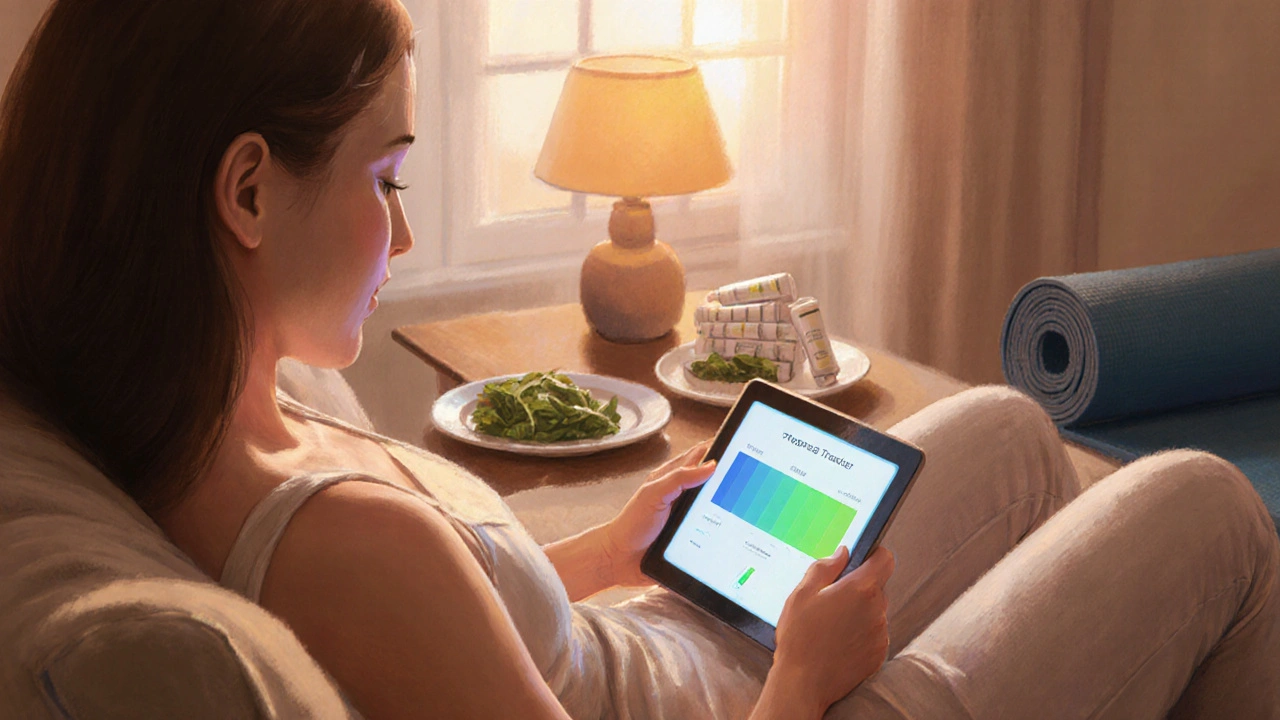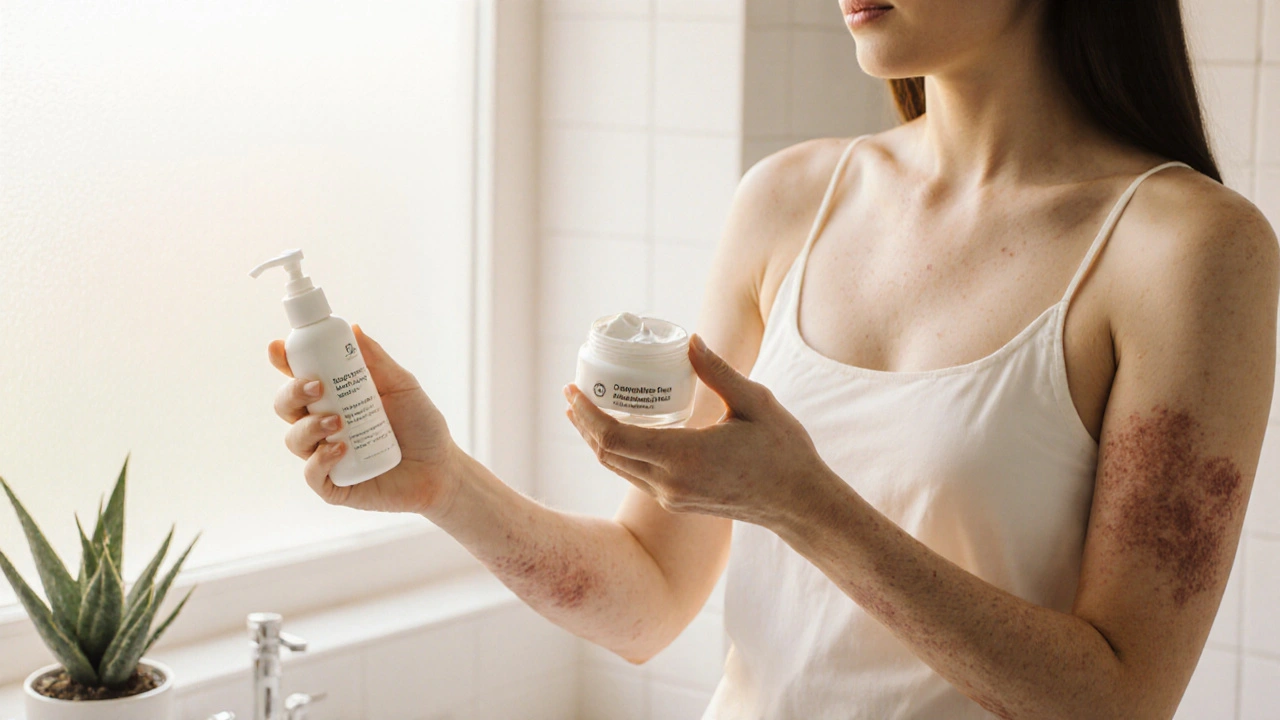Psoriasis Self-Care Tracker
Your Progress
0 of 5 tasks completed
Current Focus Area
Daily Self-Care Checklist
Apply moisturizer within 3 minutes of bathing
Include salmon, sardines, or flaxseed in your diet
30 minutes of brisk walking, cycling, or swimming
5-minute guided meditation daily
7-9 hours of sleep nightly with consistent schedule
Benefits Overview
Skin Care
Strengthens skin barrier, reduces itching and irritation.
Diet
Lowers systemic inflammation and supports immune function.
Exercise
Improves circulation, reduces flare-ups and enhances mood.
Stress Management
Calms the skin-brain axis and reduces flare-up triggers.
Sleep
Reduces cortisol spikes and supports skin repair processes.
Pro Tip!
Track your daily activities and note any changes in your skin condition. Small, consistent actions lead to big improvements over time.
Living with Psoriasis is a daily balancing act between flare‑ups and periods of calm. While prescription medicines do the heavy lifting, the choices you make outside the clinic can tip the scales toward relief or relapse. This article shows how a thoughtful self‑care routine can quiet the skin, lift mood, and boost confidence.
Understanding Psoriasis and Its Triggers
Psoriasis is a chronic immune‑mediated condition that accelerates skin cell turnover, leading to red, scaly patches. Genetics set the stage, but environmental cues such as stress, temperature changes, and diet often decide when the disease flares. Recognising these triggers is the first step toward any effective self‑care plan.
Why Self‑Care Isn’t Optional
Clinical studies from the British Association of Dermatologists (2023) reveal that patients who combine medical therapy with regular self‑care see up to a 30% reduction in PASI scores (the standard severity index). The reason is simple: self‑care supports the skin barrier, curbs inflammation, and steadies the nervous system, all of which complement drug action.
Skin‑Care Basics
What you put on your skin matters almost as much as what you take inside it. Here are the non‑negotiable steps:
- Choose a fragrance‑free, soap‑free cleanser. Harsh surfactants strip natural oils and provoke itching.
- Apply a thick Moisturizer within three minutes of bathing. Look for ceramide‑rich formulas; they restore the lipid barrier and keep scales at bay.
- Re‑apply moisturizer at least twice a day, especially after washing hands.

Diet and Nutrition
While no single “psoriasis diet” cures the disease, certain foods consistently calm inflammation. A 2022 meta‑analysis of 15 randomized trials found that omega‑3‑rich fish, leafy greens, and probiotic‑laden yogurt lowered flare‑up frequency by 22% compared with a standard Western diet.
- Diet high in omega‑3 fatty acids (salmon, sardines, flaxseed).
- Limit alcohol and processed sugars - both can trigger immune spikes.
- Consider a low‑calorie Mediterranean plan if you’re overweight; excess weight raises systemic inflammation.
Exercise and Sleep
Regular movement improves circulation, helping skin cells shed more evenly. A moderate‑intensity routine (30minutes, five days a week) of brisk walking, cycling, or swimming cuts PASI scores by about 12% (Journal of Dermatological Science, 2021). Don’t neglect sleep: under‑six‑hour nights raise cortisol, which fuels psoriasis flares.
- Exercise - aim for at least 150minutes of moderate activity each week.
- Maintain a consistent bedtime routine; aim for 7‑9 hours of quality sleep.
Stress Management and Mental Health
Stress is a well‑documented trigger. The skin‑brain axis means that emotional turbulence can accelerate keratinocyte growth. Integrating mindfulness, breathing exercises, or brief yoga sessions can lower perceived stress scores by 40% (British Psoriasis Association, 2024).
- Practice 5‑minute guided meditation each morning.
- Keep a journal to track mood swings and flare‑up patterns.
- Seek professional counselling if anxiety feels relentless.
Medical Adjuncts that Pair Well with Self‑Care
Self‑care shines brightest when paired with the right clinical tools. Two common options that often complement lifestyle changes are:
- Phototherapy - controlled UV‑B exposure reduces plaques and can lower the dose of systemic meds.
- Biologic therapy - targets specific immune pathways, offering dramatic clearance for moderate‑to‑severe cases.
When you’re on either treatment, consistent self‑care can minimise side‑effects and sustain results longer.

Build Your Personal Self‑Care Checklist
Below is a quick‑reference table you can print or save on your phone. Tick each task daily, weekly, or monthly as indicated.
| Area | Key Actions | Frequency | Benefit |
|---|---|---|---|
| Skin Care | Gentle cleanser + ceramide‑rich Moisturizer | Daily (morning & night) | Strengthens barrier, reduces itching |
| Diet | Omega‑3 meals, probiotic yogurt, limit sugar/alcohol | Daily meals | Lowers systemic inflammation |
| Exercise | Brisk walk, cycling, swimming | 150min/week | Improves circulation, cuts flare‑ups |
| Stress Management | Meditation, breathing, journaling | 5min daily | Calms skin‑brain axis |
| Sleep | Consistent bedtime, 7‑9hrs | Nightly | Reduces cortisol spikes |
Common Pitfalls and Pro Tips
Even the best‑intentioned plan can go off‑track. Here are mistakes to watch for and quick fixes:
- Skipping moisturizer after a shower - skin is most permeable then; a missed application means a dry barrier.
- Using scented lotions - fragrance compounds can ignite itching. Switch to fragrance‑free.
- Over‑exercising in hot, humid weather - sweat can irritate plaques. Opt for cooler times of day.
- Relying solely on medication - without lifestyle support, you risk rebound flares when meds are tapered.
Remember, consistency beats perfection. A few missed days won’t undo weeks of good habits.
Putting It All Together
Self‑care for Psoriasis isn’t a one‑size‑fits‑all checklist; it’s a flexible framework that adapts to your life. Start small - perhaps a nightly moisturizer routine - then layer in diet tweaks, movement, and stress relief as you feel comfortable. Over time, you’ll notice fewer red patches, smoother skin, and a brighter mood.
Embracing these habits today can turn a condition that feels out of control into a manageable part of your routine. And if you ever feel stuck, your dermatologist can help fine‑tune the plan.
Frequently Asked Questions
Can self‑care replace medication for psoriasis?
Self‑care alone usually isn’t enough for moderate‑to‑severe psoriasis. It works best when combined with prescribed treatments, helping to lower dosages and improve outcomes.
How often should I moisturize?
Apply a thick moisturizer within three minutes of bathing and re‑apply at least once in the evening. If your skin feels dry during the day, a quick top‑up helps maintain the barrier.
Is there a specific diet that works for everyone?
There’s no universal diet, but many patients benefit from anti‑inflammatory foods - omega‑3 fatty acids, plenty of vegetables, and limited processed sugars. Tracking your meals and flare‑ups can reveal personal triggers.
What’s the best type of exercise for psoriasis?
Any moderate‑intensity activity that raises your heart rate without causing excessive sweating works. Walking, swimming, cycling, and yoga are popular choices.
How does stress physically affect my skin?
Stress spikes cortisol and other inflammatory mediators, which accelerate skin cell turnover and worsen plaques. Managing stress thus directly slows the flare‑up cycle.




Gavin Potenza
October 5, 2025 AT 13:00It’s fascinating how the skin, in its constant renewal, mirrors our own attempts to rewrite habits.
When you treat psoriasis like a philosophical puzzle, the solutions become more than just creams.
Think of each moisturizer as a small act of self‑compassion, a ritual that reshapes the narrative of flare‑ups.
Consistency, not intensity, is the true alchemy that turns irritation into calm.
So, embed these tiny acts into daily life and watch the larger picture shift.
And remember, the mind‑body‑skin connection is the silent partner in this journey.
Virat Mishra
October 5, 2025 AT 13:01Seriously just slap on some cream and call it a day
Daisy Aguirre
October 5, 2025 AT 13:08Hey there fellow skin warriors, you’ve got this!
The checklist is a brilliant way to turn invisible habits into visible victories.
Every time you drizzle that ceramide‑rich moisturizer after a shower, you’re literally sealing the door on irritation.
And those omega‑3 meals? Think of them as tiny peace treaties between your gut and your skin.
Keep logging your wins, even the tiniest ones – they add up faster than you think.
Stay bright, stay bold, and let your skin shine as the canvas of your commitment.
Natalie Kelly
October 5, 2025 AT 13:10Totally! I love how simple steps become a habit when you write them down. Keep it up!
Tiffany Clarke
October 5, 2025 AT 13:16Self‑care is the quiet rebellion against a disease that loves drama.
When you choose to nourish your skin, you whisper a defiant promise to your body.
Moisturizing within minutes of a shower is a ritual that tells inflammation to back off.
Omega‑3 foods are not just trendy, they are armor for your cells.
Walking briskly for half an hour is a gentle reminder that blood flow carries healing.
Meditation for five minutes is a mental pause button that resets stress hormones.
Sleep, the unsung hero, rebuilds the skin barrier while you dream.
When you combine these acts, the cumulative effect is greater than the sum of parts.
Consistency beats occasional intensity every single time.
Tracking your habits on a simple checklist creates accountability you can see.
Noticing a pattern between a bad night’s sleep and a flare feels empowering.
Your skin becomes a diary of the choices you make each day.
Over time the patches shrink and the itching eases.
The confidence that follows is a gift beyond the visible improvement.
So keep ticking those boxes, and let each checkmark be a small victory.
Sandy Gold
October 5, 2025 AT 13:18Interesting take, but let’s not romanticize the checklist as a cure‑all.
Science tells us that while lifestyle tweaks help, they’re adjuncts, not replacements.
Don’t forget that severe cases often need systemic therapy, regardless of how tidy your habit list looks.
In other words, the “quiet rebellion” might need a louder medical voice.
Frank Pennetti
October 5, 2025 AT 13:25The pathophysiology of psoriatic keratinocyte hyperproliferation is mitigated by adherence to a multimodal regimen.
Integrative compliance amplifies the therapeutic index of biologics, thereby optimizing outcomes.
Neglecting such protocol constitutes a suboptimal risk‑benefit calculus.
Adam Baxter
October 5, 2025 AT 13:26Let’s do it! Start with that moisturizer right after your shower. Keep that checklist moving forward every day.
Keri Henderson
October 5, 2025 AT 13:30You’ve already taken the hardest step by acknowledging the need for change.
Now map out a realistic schedule – maybe set a phone reminder for your evening moisturizer.
Celebrate each small win, like a 5‑minute meditation, because consistency fuels momentum.
Remember, you’re the captain of this ship; steer it with confidence.
elvin casimir
October 5, 2025 AT 13:31While the enthusiasm is admirable, there are a few grammatical slips to note.
“Your” should be “you’re” in “you’re already taken the hardest step”.
Also, “captain of this ship; steer it” would read smoother with a colon instead of a semicolon.
Proofreading enhances credibility alongside your self‑care plan.
Steve Batancs
October 5, 2025 AT 13:36The article presents a comprehensive self‑care framework that aligns with current dermatological guidelines.
Incorporating moisturization, dietary adjustments, regular exercise, stress mitigation, and adequate sleep constitutes a holistic approach.
Such multidimensional strategies have been shown to synergistically reduce PASI scores.
Patients are encouraged to adopt these practices in conjunction with prescribed therapies for optimal outcomes.
Ragha Vema
October 5, 2025 AT 13:40Wow this feels like the hidden agenda they don’t want you to see – the pharma giants pushing meds while ignoring simple habits!
But seriously, the truth is out there and it’s right in your daily routine.
Stay woke and keep checking those boxes.
Scott Mcquain
October 5, 2025 AT 13:45Indeed, self‑care, when executed consistently, reduces inflammation, strengthens barrier function, and improves quality of life, especially for those battling chronic conditions, such as psoriasis, therefore, it should never be dismissed as merely optional.
kuldeep singh sandhu
October 5, 2025 AT 13:46Sure, the checklist sounds nice, but life isn’t always that linear.
Sometimes you just have to roll with whatever the day gives you.
Mariah Dietzler
October 5, 2025 AT 13:50i get the idea but honestly it feels like a lot of hype for a couple of steps.
maybe just stick to the basics and dont overthink it.